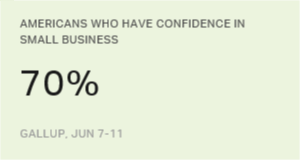PRINCETON, NJ -- Though Americans remain cautious about the future course of the U.S. economy, they are much more optimistic in 2009 than they were in 2008. In the first half of 2009, 27% of Americans, on average, believed the economy was getting better, more than double the average for 2008 (13%). Following the District of Columbia at the top of the list, the states that currently are most optimistic about the economy are South Dakota, New Mexico, and North Dakota. Wyoming and West Virginia residents are the least optimistic.
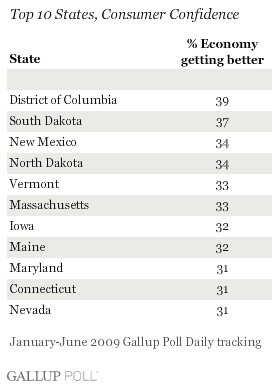
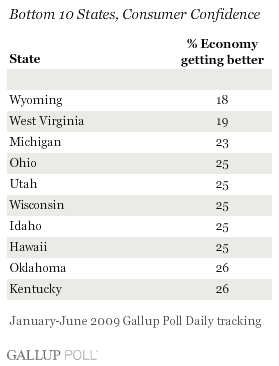
The accompanying map shows the percentage saying the economy is getting better by state in the first half of 2009.
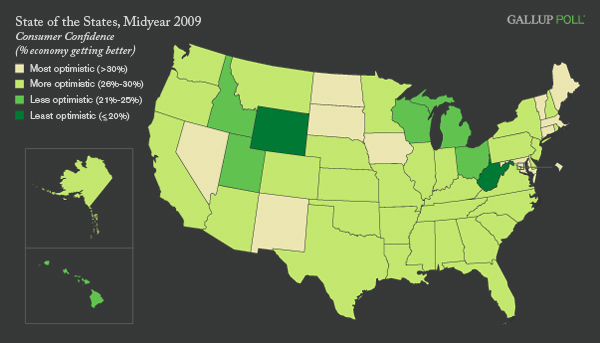
To underscore the improving optimism about the economy this year, Wyoming's state-low 18% "getting better" reading in 2009 matches the highest state scores from 2008.
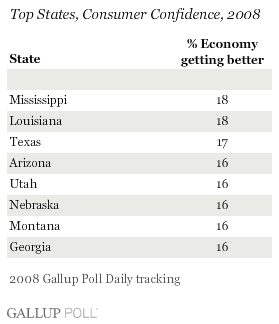
Even though Americans' economic outlook remains more negative than positive on an absolute basis (from January through June, an average of 66% said the economy was getting worse), all states plus the District of Columbia express greater optimism about the economy this year than they did last year.
The greatest gains in optimism have come in the District of Columbia, South Dakota, Maine, and Massachusetts. Several other Northeastern states show increases near or exceeding 20 percentage points.
On the other hand, Wyoming has shown the smallest increase -- three points. West Virginia and Utah are the other two states to show less than a 10-point increase in economic optimism compared with last year.
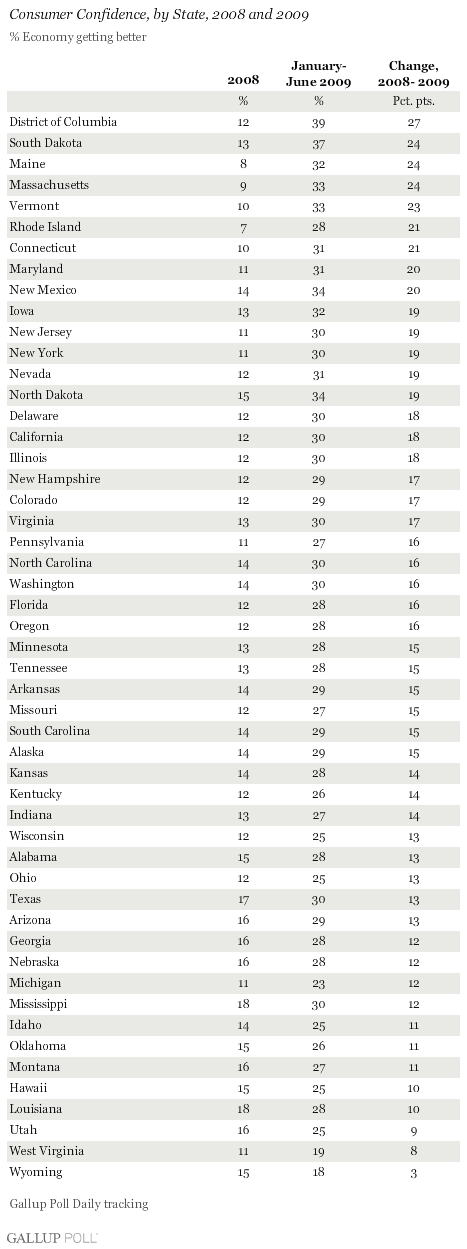
To a large extent, the degree of change is related to a state's political orientation. Most of the states showing the greatest gains in economic optimism are solidly Democratic states, likely reflecting their enthusiasm about the new Democratic presidential administration. Likewise, many of the states showing the least improvement are Republican in orientation. Thus, there is a strong element of political partisanship in Americans' perceptions of where the economy is headed.
Rating of Current Economy
At the same time that Americans are more optimistic about the economy's future direction, the 2009 data show a less positive assessment of current economic conditions than was the case in 2008, on average.
In other words, Americans have higher hopes for the future this year compared to last, but do not believe those hopes have been realized as of yet. These data are corroborated by other Gallup economic data showing that Americans report spending less on a daily basis in 2009 than they did in 2008, and also that working Americans are less likely to report their employers are hiring new workers than was the case in 2008.
The percentage of state residents who rated the current economy "poor" in the first half of 2009 has increased in every state compared with last year, ranging from lows of one point in Vermont and two points in West Virginia to a 23-point increase in Wyoming.
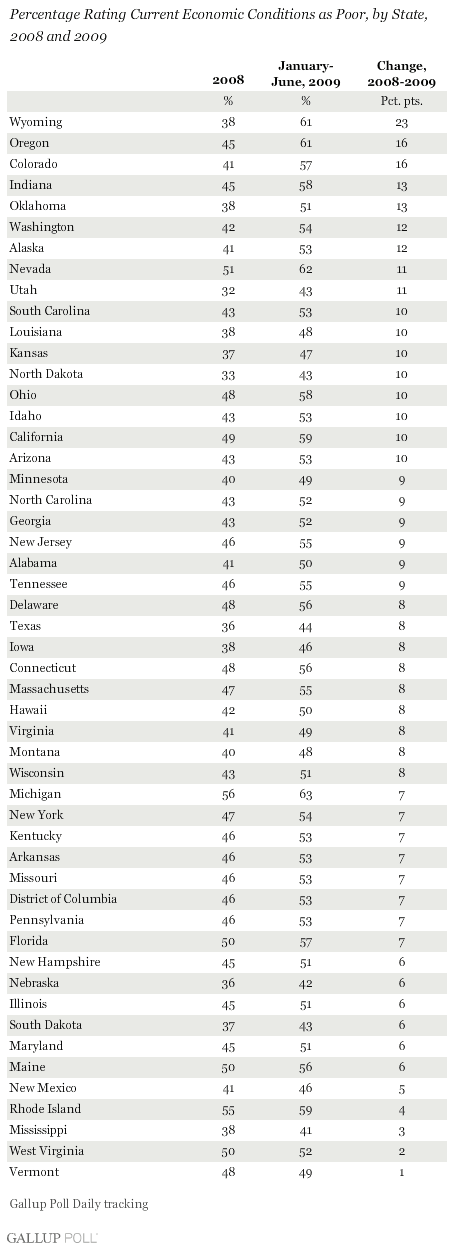
For this measure, the relationship appears to be somewhat less strong between a state's political party leanings and the degree to which its ratings of the current economy have changed this year.
On an absolute basis, residents of Michigan had the most negative ratings of the economy in the first half of 2009, while residents of Mississippi were least likely to rate the economy as poor.
In addition to Michigan, Nevada, Oregon, and Wyoming residents had the most negative ratings of the economy in the first half of 2009, each with "poor" ratings exceeding 60%. Even the states with the most positive evaluations of the economy on a relative basis, including Mississippi, Nebraska, the Dakotas, and Utah, had "poor" ratings above 40%.
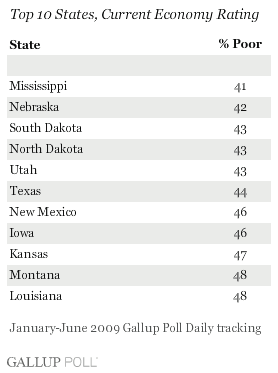
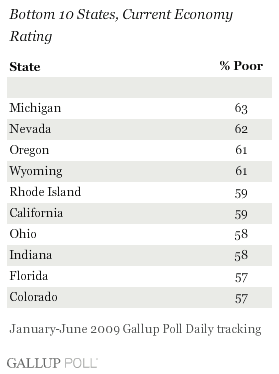
The accompanying map shows the percentage of each state's residents that rated the economy poor in the first half of 2009.
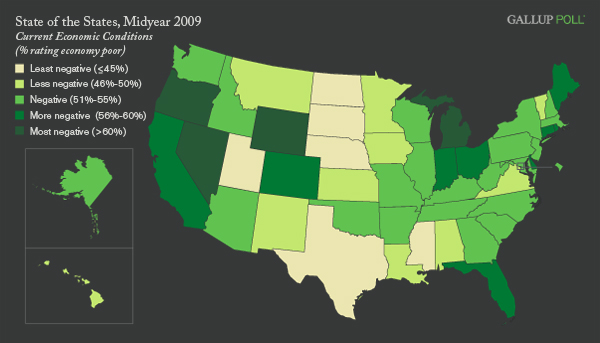
Consumer attitudes in the United States have shifted over the past year, including more dour assessments of the current economy but also a sunnier outlook on where the economy is headed. These changes are evident in every state in the union as well as in the District of Columbia, though the magnitude of the change varies by state. To a large degree, particularly with regard to perceptions of the economy's future direction, these changes seem to be influenced by partisanship, as some of the more Democratic states tend to be most optimistic about where the economy is headed, now that President Obama is charged with turning the economy around.
Gallup.com's "State of the States" series reveals state-by-state differences on political, economic, and wellbeing measures Gallup tracks each day, based on data collected between January and June 2009. To see all stories published in the midyear 2009 series, click here. New stories will be released throughout the month of August.
Survey Methods
Results are based on telephone interviews with 78,688 national adults, aged 18 and older, conducted Jan. 2-June 30, 2009, as part of Gallup Poll Daily tracking. For results based on the total sample of national adults, one can say with 95% confidence that the maximum margin of sampling error is ±1 percentage point.
The margin of sampling error for most states is ±3 or ±4 percentage points, but is as high as ±10 points for the District of Columbia and ±9 points for Wyoming.
Interviews are conducted with respondents on land-line telephones (for respondents with a land-line telephone) and cellular phones (for respondents who are cell-phone only).
In addition to sampling error, question wording and practical difficulties in conducting surveys can introduce error or bias into the findings of public opinion polls.
